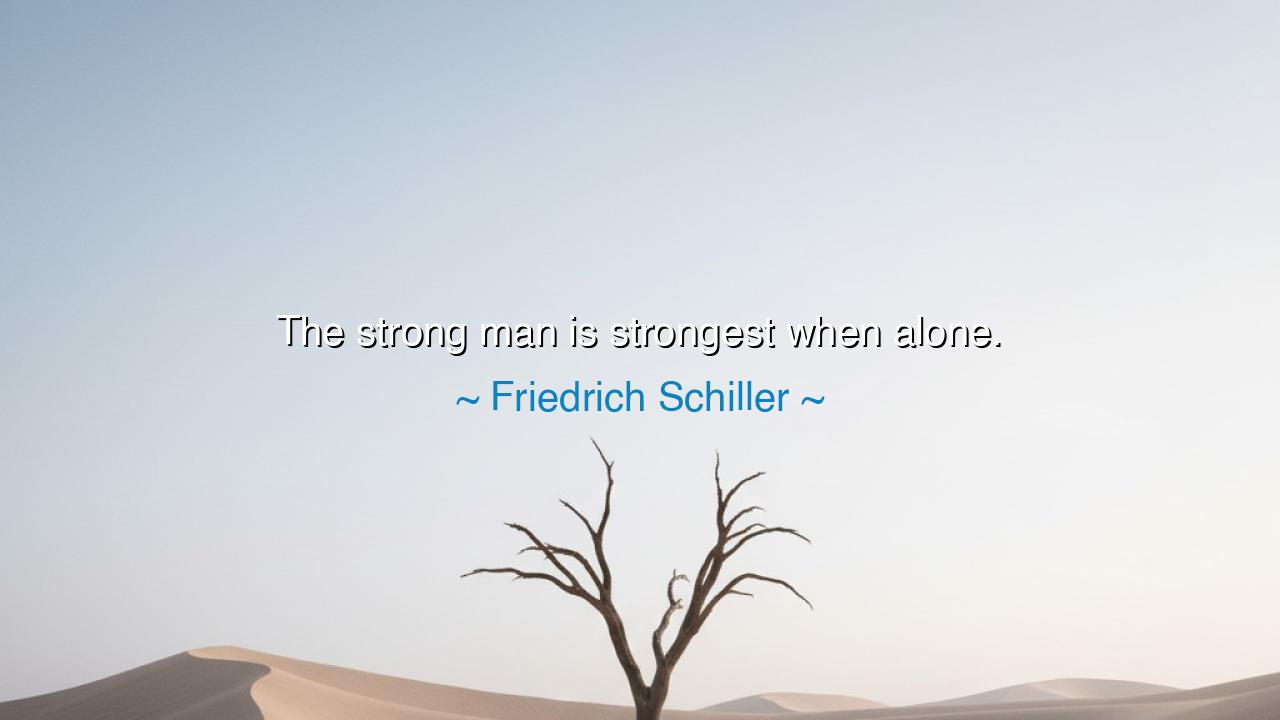
The strong man is strongest when alone.






"The strong man is strongest when alone." These words, spoken by the philosopher and poet Friedrich Schiller, carry with them the weight of deep wisdom—a wisdom that echoes through the ages and speaks to the very core of human resilience and inner strength. In a world that often values the company of others, the voices of support, and the communal bonds we share, Schiller’s declaration challenges us to consider a truth that lies at the heart of every hero’s journey: true strength is often forged in the solitude of one’s own soul. It is when we are alone, free from the distractions and expectations of others, that we find the deepest wells of our own power.
In solitude, the strong man is unshackled by the influence of others, unburdened by the need for approval or validation. Here, in the silence, he confronts the very essence of his being. Without the interference of external opinions, he is free to forge his path, to wrestle with his own fears, and to rise above the trials that threaten to break him. It is in this aloneness that his true character is revealed, not through the adulation of crowds, nor through the praise of companions, but through the unyielding strength of his own will. The strong man does not seek the comfort of others; he finds his comfort in the depths of his own resolve, his ability to endure, and his unshaken belief in his own purpose.
Consider the example of the great philosopher Socrates, who, though beloved by his followers, spent much of his life in solitary contemplation. It was in moments of solitude that Socrates was able to engage with the deepest questions of existence, to challenge his own thoughts and beliefs, and to cultivate the wisdom that would inspire generations. His strength was not in the numbers of his disciples, but in his unwavering commitment to truth, a truth that he discovered not in the crowds but in the stillness of his own heart. In the solitude of his inner world, Socrates became the epitome of strength, standing firm in the face of public opinion, knowing that only by embracing his inner convictions could he ever truly serve the greater good.
The strength that Schiller speaks of is not the physical might that can be seen in the battlefield or the marketplace, but a spiritual strength, a strength that grows in the silence of solitude, away from the judgments and expectations of others. It is the strength to endure suffering, the strength to rise from failure, and the strength to remain true to oneself in the face of adversity. This kind of strength is tested when we stand alone, without the safety net of others’ support, and yet find the courage to press forward.
Look at the example of Nelson Mandela, whose strength was not merely in his leadership but in his ability to endure 27 years of imprisonment. While many would have crumbled under such oppression, Mandela found his strength in solitude, in the stillness of his own thoughts, in his deep reflection and commitment to his cause. It was in the prison cell, where he was alone with his beliefs and ideals, that his resolve was solidified. The strong man does not shy away from solitude, for he knows that it is in these moments that he is truly tested and that his true character emerges.
Schiller’s words urge us to look within for the strength we seek. It is easy to be strong in the presence of others, to feel emboldened by the support of friends and comrades. But the true measure of strength is found in the solitude of the individual. It is here that the strong man must confront his weaknesses, his doubts, and his fears, and yet remain steadfast. For, in aloneness, we come to know ourselves in a way that is impossible when surrounded by the noise of the world. It is here that we become masters of our own fate, for only when we are alone can we truly discover what we are made of.
The lesson here is clear: to become truly strong, we must be willing to face moments of solitude, to seek the silence where we can listen to the whispers of our own heart. In this space, we learn to trust ourselves, to endure the storms of life, and to rise above the forces that would break us. Solitude is not a punishment, but a crucible where our strength is forged. In moments of loneliness, instead of seeking external validation, we must look inward, for it is there that we find the well of strength that sustains us.
In practical terms, this means embracing the moments when you are alone. Do not fear solitude; instead, seek it out as a time to grow, to reflect, and to strengthen your inner resolve. In the quiet moments of solitude, learn to be at peace with yourself, to understand your own desires and fears, and to develop the courage to walk your own path. The strong man is not defined by the crowds he commands or the applause he receives but by the strength of his spirit, which grows in the silence of solitude.






AAdministratorAdministrator
Welcome, honored guests. Please leave a comment, we will respond soon